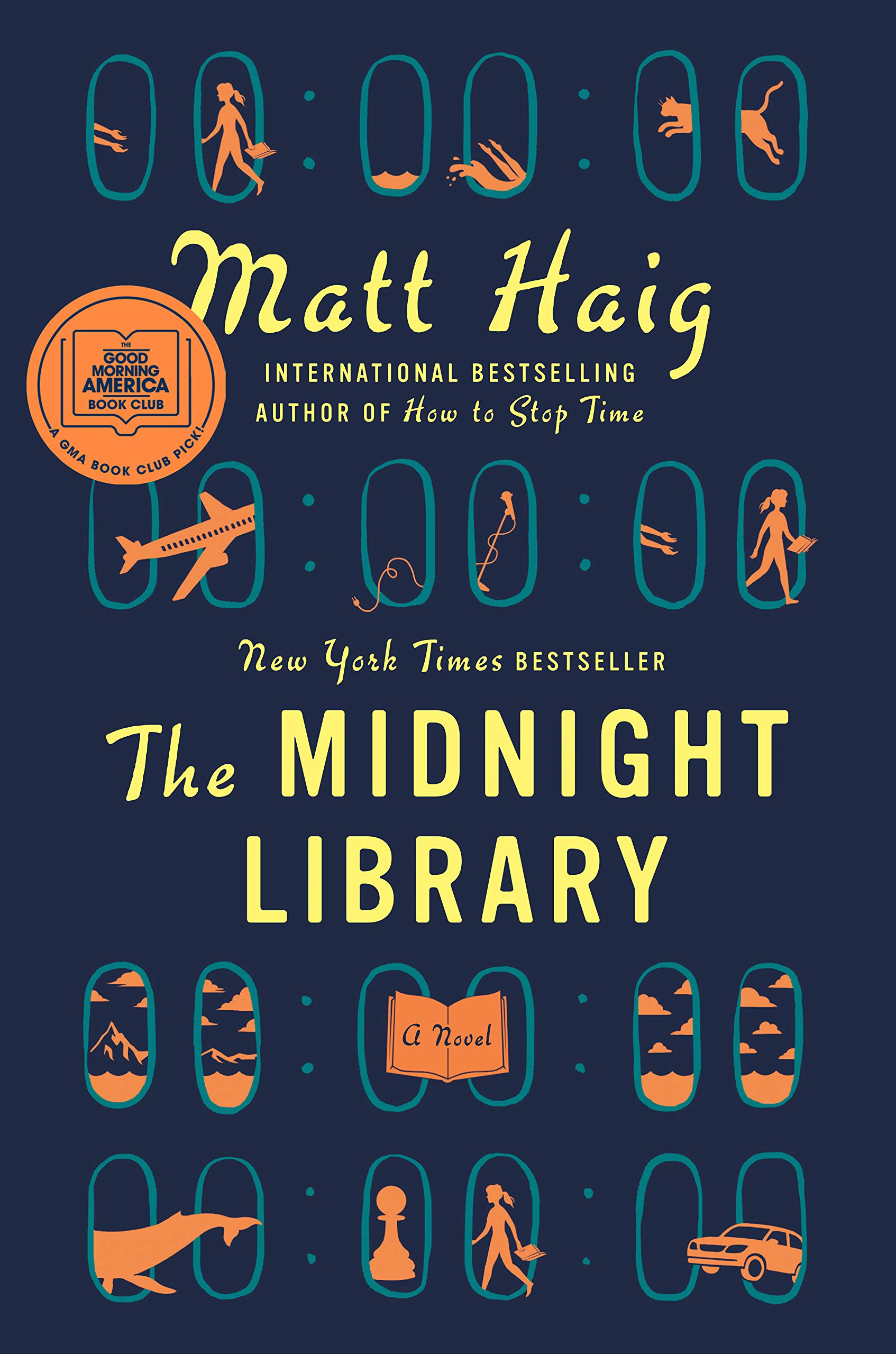Reading That Moves You
My analysis of The Midnight Library by Matt Haig
It has been a while. I have enjoyed a nice writing sabbatical and I am not assumed to say it. Like John Wick said “People keep asking me if I am back. And you know…I am thinking I am!” What drove this motivation, while of course a book! The following passage is dedicated to the book that has made me think and daydream. The narrative story encourages deep self-reflection and continuous moments of gratitude for the life we get to live. The grass is perfectly green right where you are. Stay in the yard.
The B.E.W Book Club’s May 2021 choice was The Midnight Library by Matt Haig is a science fiction novel with a hint of a literary dramatic base. The author does spend significant time setting up the otherworldly elements, but at its core, it is a single dramatic telling of a woman looking for a better life. I loved this story for so many reasons, but mainly I loved it because it brought delightfully memories of things I aspired to be while reminding of that I am who I am because of the decisions I have already made. And I like me.
As a rough summary. The main character Nora is experiencing a “valley” period” of life. She is alone, sad, and managing life horribly. She has the chance to review her life’s choices and make different decisions which in turn gives her an opportunity at new lives. The unreal hypothetical journey takes her to places she would never dream to go and shows her life of regrets. Nora must overcome the barriers and feelings of who she thought she would be to become the positive version of who she already is. Sounds deep and vague…GREAT! Before I go any further in my analysis of The Midnight Library, I would like to clarify this. The book is full of mental triggers. From the reviewing of regrets to the views of death and life; the author does not provide barriers in writing. If you have any issues processing the following topics: Suicide, Depression, Death, Living Life, or Alcoholism, this is not the book for you right now. The reading of this blog piece may not be the read for you. And that is okay. Please take care of yourself first. I thank you for visiting my page and listening to my rambling. You can surely feel free to piece another article or review from the “Fun Stuff” tab. Lastly, for those interested in The Midnight Library, I will give spoilers here. So, continue reading at your own risk.
Some of my favorite story themes are alternative universes, time travel, and different dimensions. Haig’s novel doesn’t include traditional applications of time travel. There is no going to a different year to see what happens in the future, or past; like the series Timeless (Awesome Show). The novel does include ideas of different dimensions if you consider the concurrent timelines, but really it is a story of alternate timelines based on alternate choices. The main character Nora Sneed in the beginning makes the choice to end her life. She is lonely and a bit pitiful and the author makes it clear as to why. Reading the first 5 chapters was honestly a little depressing. I understood the setup, but could not help but think “man can this woman catch a break?” Eventually, she does when she goes into a limbo/purgatory/coma-like situation. Now, I should back up a bit and explain that I recently finished reading Life After Death by Sistah Soulja. This highly anticipated follow-up to The Coldest Winter Ever was a big disappointment to me partly because of the themes of purgatory and the afterlife. You can read more about my thoughts on that on my Goodreads.com page.
Anyway, as I read the opening of The Midnight Library, I thought we were going down another sad unclarified path of the afterlife. I was pleased that the more balanced Sci-Fi approach prevailed. After “deciding to die” Nora enters a library. It is more otherworldly than physical and the author’s description of the shelves, books, and traveling to this in-between place is one of the best parts.
“The place was well lit, and the floor was like—somewhere between light yellow and camel-brown, like the colour of an ole page— ”
The Midnight Library ~Matt Haig
Throughout the book, I enjoyed the descriptions of mundane things. Like the sign out front of her pub in her first life she visits and the description of the cold in another life. Haig does an amazing at this.
So as Nora chooses a book from the library, she can read it and transport herself into that version of her life. I will not totally spoil the whole story, but I will say Nora visits a lot of versions of herself based on the regrets she thinks she has. Most of the lives she visits reflect a different decision she could have made in her life. She experiences different career types, different marriages and relationships, and varying degrees of physical and mental health. This is the story.
While reading I thought a lot about my past and the decisions I have made. During the B.E.W. Book Club discussion, we talked about the definition and scope of regret. The word has such weight to it as the story depicts. Nora’s ‘book of regrets” is so much she is swallowed whole with emotions just looking at it in the mythical library. I think while analyzing the past you can become regretful, but for me, it has just becoming thinking and daydreaming. So, I developed a shortlist of different versions of myself that I would love to see just for fun.

- The life where I became a JAG lawyer!
- The life where I choose to get my first tattoo on my left arm instead of my right!
- The life where I did get to go on that trip to Washington D.C. with my church!
- The life where I got to find out what happened to my dog Rusty (someone stolen him Summer of 1994!)
- The life where I got to be a world classic gymnast like Dominque Dawes!
- The life where I can actually sing like Anita Baker (In my head I can!)
These are just a few wonders that I have. But they are just that wonders!
I also have been thinking about reactions from this title from older generations. I am curious what the 70-year-old readers think about this book. The main character Nora is in her early to mid-’30s in her root life, but she travels to versions of herself that reflect the decisions she made at early points in her life. Do seniors have these thoughts more frequently?
She also interacts with a host of different people, but one of the most interesting is Hugo. Hugo is the only character in the story that can give her more insight into this limbo-like environment. He too has a library in the form of a video store. He has been “sliding” for a long time and expresses his wish to never stop. See Nora’s learns that her library is directly connected to her status of being alive. But once she chooses a life she wants to live, she believes she can permanently stay in that life. Hugo to me represents the little voice on the shoulders saying, “Don’t choose, just stay here”. Now as a Christian woman I have a strong belief in what most call “afterlife” and “purgatory” etc. Simply put I believe if you die, you go to heaven or hell. Period. However, at this point in the story, it is still unclear rather Nora is dead. I think she is in some type of coma and that opened a deep question for me.
Does the will to live become stronger when you are dying? Hugo is almost encouraging her to not live or die, but to just stay. Which from a character arch perspective is genius, but one of Nora’s biggest character flaws is her inability to make solid decisions and be happy with the choice. BRILLIANT MATT HAIG! Ultimately Nora sees the downsides of bouncing from life to life only to be faced with the same issues of family abandonment, depression, and general unsuccessful versions of herself. She sees that not having a constant stable life is not for her as well. The life she is ultimately happiest with is with Ash and Molly where she is living a fairly suburban lifestyle with moments of love and whimsy throughout. This is coincidentally where we learn about Nora as a mother.
This is where I relate to her the most. While I do occasionally daydream about my interest in track, gymnast, and of course music; I cannot imagine a life where I have so much variation in my day. I love the simple life of going to a career I love for a few hours and then coming home to loud children and a wonderful husband. I enjoy the knowledge of knowing who is in my circle and why they are important. Throughout all the lives Nora visits, the life with Ash and Molly in Cambridge is the only she didn’t have to second guess its importance.
She knew. As I have known. The life I am in is the life I was meant to be in. My husband was meant for me and even if we met and married with a different story, we are destined. The children I have are the children God wanted me to have, and despite a history of loss and some pain, I have no doubt that my sons and daughter were meant to be my children. I am thankful for this acknowledgment and for this life.
Now it may sound like I am giving this title 5 out of 5. It may sound like this title hit every note perfectly, however as we know every book, even our favorites have flaws. Matt Haig does a great job of describing Nora’s surroundings. As a reader, you can tell it is more for the benefit of the displaced main character. Either way, it is nice. However, what he fails to do is describe how Nora and her infinite lives are doing to fix her broken lives. The first few life jumps put her into similarly dismal existences and the writer either doesn’t leave her in the life long enough to fix, i.e., Nora’s life with the dead cat, or Nora’s life in the artic. How does she try to overcome her challenges? Even if unsuccessfully, shouldn’t she still try? I feel like the character Nora would, we just didn’t get to hear about it. We did get to hear about many lives she journeys through. Understanding that using the books in her metaphorical post-life library is the entire premise of the story, I do still feel like there were TOO MANY TRIPS. I would have been in with half the journeys and still understood the story and what she went through and what needed to happen to get her to her character ARC.
This story brought more than reflective thoughts to mind. As mentioned before the descriptiveness of the small things in this story was very nice and I enjoyed them. Because of this, I know what to research and learn about the following things:
Bedford-A town in England
The University of Cambridge-A renewed interest
Henry David Thoreau- I WANT TO KNOW EVERYTHING
The Midnight Library did a lot for me. And I am glad, even after a delay ‘00:001’; I took the time to read it. The novel moved me, and I suggest you read it too. See where The Midnight Library takes you.
